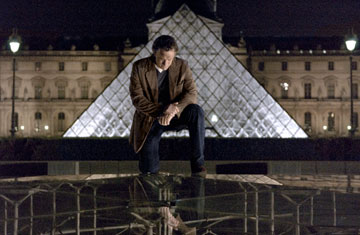The Da Vinci Code: Defending the Indefensible
 Every rational part of my brain tells me that The Da Vinci Code is a enormous piece of crap. I cannot defend the mediocre direction, the frequently laughable screenplay, or the largely uninspired performances. The rational part of me is telling me not to write this post at all; it, in fact, has demanded I include this disclaimer:
Every rational part of my brain tells me that The Da Vinci Code is a enormous piece of crap. I cannot defend the mediocre direction, the frequently laughable screenplay, or the largely uninspired performances. The rational part of me is telling me not to write this post at all; it, in fact, has demanded I include this disclaimer:The following blog entry does not in any way represent the logical, professional part of Matt Singer. That part of Mr. Singer apologizes deeply for what follows, and adds that it liked Army of Shadows very much.
I liked The Da Vinci Code. Despite all of its overabundant flaws, I, king suckerman that I am, got drawn in completely by the story that's captivated millions of reasonably literate men and women all over the world. Having not read Dan Brown's original novel, I had only a superficial understanding of what the movie was going to be about, and so, as the story unfolded, I was able to enjoy it for its shocks and surprises as readers of the book were almost surely not.
It doesn't surprise me that fans of the book might be disappointed by the movie; director Ron Howard and screenwriter Akiva Goldsman bring very little to the table. The pacing of the first hour — the stuff before the story gets good 'n' juicy — is sluggish, the dialogue borders on flat-out camp (a specialty of Goldsman, who wrote Batman & Robin for Joel Schumacher before discovering respectibility with Howard on A Beautiful Mind and the underrated Cinderella Man), and all the best moments involve jowly white dudes sitting around arguing arcane historical minutiae. Though the Olympic sprinter's pacing of Brown's novel has been compared for years to Hollywood blockbuster storytelling, on the screen it looks rather stiff. Howard, who probably had an unlimited budget, seems desperate to expand the novel visually while simultaneously at a complete loss how to do that without straying from the text and therefore angering hardcore fans. Thus the most visceral and complex CGI effect in the film involves a bullet shell getting lodged in a car door. Ooooo....
AND YET! I liked it. Ian McKellan, MVP of X-Men: The Last Stand is MVP once again, delivering the big reveal about the Last Supper and the Holy Grail and the biblical peeps and whatnot with the sort of zeal and passion that is strangely absent from nearly every other aspect of the production and, really, if only one part of the whole film had to work, it was that one. And, from his big scene on, I was totally and irrationally hooked.

0 Comments:
Post a Comment
<< Home